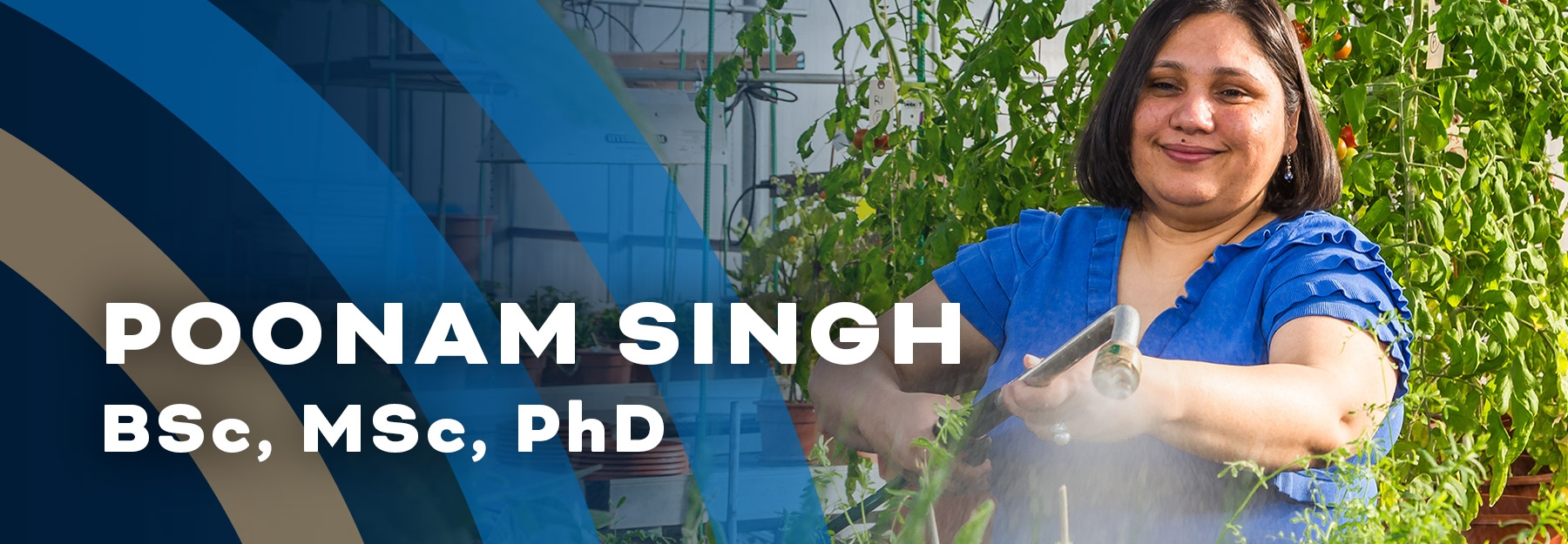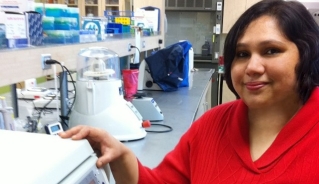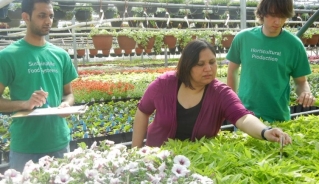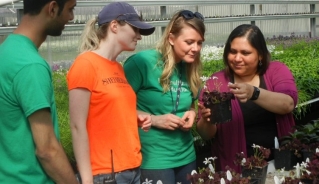Poonam Singh BSc, MSc, PhD
Biography
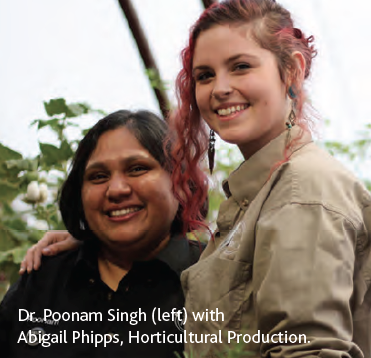
Specialist in greenhouse horticulture, controlled environment agriculture, soilless growing media, rootzone management, plant physiology, and sustainable crop production technologies.
Dr. Poonam Singh’s primary research interests encompass the development of sustainable technologies for greenhouse-based production of horticultural crops with a focus on the development/assessment of innovative soilless media and substrates, rootzone management of greenhouse crops, hydroponic crop systems, controlled environment agriculture, and the study of horticultural crop physiology.
With a proven ability to lead both national and international research and development projects in the industry, Dr. Singh is dedicated to promoting sustainable practices and optimizing resource efficiency on horticultural farms; her goal is to contribute to the promotion of environmentally conscious agriculture. Dr. Singh’s strategic vision is characterized by a comprehensive perspective that addresses not only the immediate objectives of individual projects but a more extensive mission to contribute to the progressive evolution of the horticultural landscape. Through her scholarly pursuits, she strives to cultivate a culture of innovation, fostering forward-thinking across all aspects of research and development. Dr. Singh’s dedication to contributing meaningful insights is evidenced by a substantial track record of published research papers in esteemed academic journals, complemented by the honor of receiving numerous prestigious grants from various public and private funding agencies and industry-focused groups.
Dr. Singh has been actively involved in advising, mentoring, and guiding students toward academic excellence throughout her professional journey. Dr. Singh plays an active role in numerous academic and research committees. She contributes her expertise as an advisory board member and examiner for post-graduate research studies across multiple universities. Additionally, she serves as a reviewer for various academic journals and grant applications.
Research Focus
- Sustainable Greenhouse Crop Production
- Controlled environment agriculture
- Protected Crop Cultivation
- Soilless Growing Media Applications
- Hydroponic Crop Cultures
- Horticultural Crop Physiology
- Vertical Farming
Most Significant Contributions:
- (2021): Developed molecular diagnostic tools for early detection of onion neck rot disease in Manitoba.
- Identified the Botrytis species through microbiological and molecular techniques. This project provided Manitoba onion producers with critical information on the early incidence and prevalence of Botrytis neck rot pathogens under field conditions.
- Practical Application: This knowledge about the timing of infection in the field will be useful in helping farmers to develop and evaluate management strategies in the field, and also predict the storability and availability of quality bulbs for sale.
- (2021): Evaluated onion germplasm for susceptibility to onion neck rot disease.
- Identified correlations between genetics, the environment, and onion neck rot disease prevalence in Manitoba. Compared the direct seeding versus transplanting methods for onion growth and yield parameters. This project compared methods of planting onions through direct seeding and transplanting seedlings for maximizing bulb yields and maintaining bulb quality in long-term storage. Results revealed that transplanting seedlings in the field produced significantly higher yield (total and marketable), and larger, heavier, firmer, and uniform bulbs as compared to the direct seeding method of planting.
- Practical Application: The study provides information to prairie growers of Manitoba regarding best varieties and management practices to achieve higher bulb yields and quality while minimizing post-harvest losses in the storage.
- (2021): Determined the response of cucumber to the oxygen-enriched nutrient solution under different greenhouse environments.
- For this project, a study was performed to determine the effects of supplemental oxygen on hydroponically grown cucumber plants under two different greenhouse environments – a high technology greenhouse, and a solar greenhouse. The solar greenhouse produced a lower cucumber yield than high technology greenhouses, and the fruits from solar greenhouse also had a lower shelf life. The oxygen enrichment of nutrient solution improved the postharvest quality of cucumbers in both the greenhouse environments.
- Practical Application: This study provides recommendations to greenhouse vegetable growers to supplement rootzone oxygen to boost growth, yield and post-harvest quality of crops.
- (2021): Assessed the efficacy and compatibility of biological pest agents in the floricultural greenhouses.
- Developed a customized integrated pest management program using biological pest control agents at a commercial greenhouse in Manitoba. Within this project, many different combinations of biocontrol agents were tried at the Shelmerdine Garden Center, Manitoba. Researchers found that the combinations of tried biocontrol agents worked well together without interfering with one another to reduce efficiency.
- Practical Application: This information has the potential to be of great value to floricultural greenhouse growers in Canada and elsewhere in the world where climatic conditions similar to Canadian prairies prevail. The success of this program will encourage other greenhouses to grow their crops using more sustainable and eco-friendly practices. Furthermore, the present study is anticipated to create possibilities for growing food in the greenhouses for remote and isolated communities of the north, where food insecurity is extremely high.
- (2020): Established a garden for the conservation of traditional crops with cultural significance to indigenous people of Canada.
- Compared different methods of propagation (sexual and asexual) of the native species of Manitoba under in vivo conditions. Assiniboine Community College’s traditional Indigenous plant garden began in 2015 as a small project to enable students to identify native plants. Since then, the garden has taken on a wider community significance, while also increasing in its footprint and plant diversity. This traditional Indigenous plant garden is a multidimensional platform that allows for celebration and conservation of plants – in order to contribute to local, traditional food sovereignty efforts.
- Practical Application: The garden has grown, and continues to grow into an initiative that serves the broader College and local communities more often – through growing, workshops, developing plant production protocols, teaching, demonstrations, plant identification seminars, and technology testing.
Projects
Ongoing Projects:
Developing Sustainable Peat-Reduced Media Blends from Agricultural and Timber Industry Waste Stream Products:
- Use of peat, the single most commonly used growing media, is of high concern due to its non-renewable nature and the significant environmental damage caused by peat extraction, including habitat destruction and increased carbon emissions. My research focuses on creating peat-reduced growing media by incorporating waste and by-products from the agricultural and timber industries, such as wood fibers, cattail and hemp fibers, wool pellets, and biochar. The aim is to standardize protocols for determining the bio-physicochemical characteristics of these materials, and exploring their potential as sustainable components for growing media.
My work seeks to establish viable media alternatives for potted plant cultivation and hydroponic vegetable production to grow crops such as tomatoes, peppers, strawberries, cucumbers, cucurbits, pepper and eggplants. This also includes evaluating the sustainability of various soilless media blends, their environmental footprint, potential for reuse or recycling, and overall contribution to reducing resource consumption in horticulture. Developing these alternative growing media will not only support environmental conservation but also enhance resource efficiency and waste management, paving the way for more sustainable and resilient agricultural practices.
Assessing the Physicochemical Properties and Phytotoxicity of Composted Wastes for Potential Use in Growing Media:
- The integration of diverse composts into growing media represents a promising strategy to enhance horticultural productivity and sustainability. Utilizing compost offers numerous benefits, including enhancing soil organic matter content, fertility, and overall plant growth by improving the physical, chemical, and biological properties.
My current research focuses on integrating composts derived from various feedstocks (for example, vermicompost, biochar-based composts, green waste composts) and composting methods (aerobic and anaerobic) into growing media. By examining the physicochemical properties and phytotoxicity of different composted wastes, my research aims to identify the most effective compost blends for horticultural applications including better growth, yield, and quality of plants. This involves detailed analysis of compost maturity, composition, nutrient content, moisture retention, microbial activity and other relevant factors. The studies also explore the disease suppressive effects of composts, aiming to understand their potential in reducing plant pathogens and promoting healthier crop production.
Assessing Nutrient and Water Use Efficiencies of Crops Grown in Various Media Blends Under Protected Structures:
- Water and nutrients are vital inputs for plant growth. Fertigation, a technique where fertilizers are dissolved in irrigation water, is commonly used in soilless production systems to enhance the efficiency of nutrient delivery. My research aims to identify best practices for soilless cultivation that enhance resource efficiency, improve crop performance, and support sustainable and economically viable greenhouse production systems.
Current research project focuses on evaluating the nutrient and water use efficiencies of greenhouse crop production using alternative soilless media blends under fully and semi-controlled greenhouse conditions, as well as in high tunnels. My research is examining how different media blends influence the availability and uptake of essential nutrients by plants, and identifying the optimal nutrient formulations for each blend to maximize plant health and productivity along with assessing the water retention and delivery capabilities of various media blends. It is also exploring irrigation strategies that minimize water usage while ensuring adequate hydration for crops.
Enhancing Stress Resilience in Horticultural Crops Using Plant Growth Regulators in Controlled Environments:
- The strategic use of plant growth regulators (PGRs) can significantly enhance the ability of horticultural crops to withstand biotic and abiotic stresses within the controlled environments of greenhouses and high tunnels. This research aims to optimize the yield and quality of crops, improve their health and vigor, and increase their adaptability to challenging environmental conditions through the application of these regulators. We are assessing how PGRs influence crop health, vigour, yield and quality by measuring parameters such as growth rates, leaf chlorophyll content, root development, fruit size, weight, nutritional content, and shelf life to determine the overall benefits of PGR application. In addition, study also entails optimization of application methods of PGRs by standardizing optimal concentrations, timing, and delivery methods to maximize their efficacy.
Evaluating Key Parameters for the Operation of Modular Freight Container Farms for Leafy Greens:
- This research is investigating the fundamental parameters required for the effective operation of innovative modular freight container farms specifically designed for growing leafy greens. The study includes a comparative analysis with traditional greenhouse-based growing systems, aiming to evaluate and contrast their operational characteristics, efficiency, and overall viability in various agricultural contexts. My research is optimizing environmental control systems within container farms, such as lighting, temperature, humidity, and CO2 levels, to maximize crop yield and quality.
Enhancing Hydroponic Vegetable Crop Production in Manitoba:
- The roots and microbes of plants can exhaust oxygen to hypoxic (low) or anoxic (no oxygen) levels in hydroponic cultures. Supplemental oxygen in the root zone accelerates water and fertilizer absorption by the plants, increasing plant biomass, crop yield and fruit shelf life. My recent study examined the response of horticulture plants to oxygen-enriched nutrient solution under different greenhouse environments-high technology and solar greenhouses. Results showed the solar greenhouse produced a lower crop yield than high technology greenhouses and fruits produced in the solar greenhouse also had a lower shelf life. The oxygen enrichment of nutrient solution improved post-harvest quality of fruit in both the greenhouse environments.
Extension ACTIVITIES (LAST 5 YEARS):
Knowledge transfer events organized/attended:
- Speaker at ‘Grow 2024 and Grow 2023’ conference by MB Landscape and Nursery Association (2024, 2023); Panellist at ‘Cultivate’ Sustainability Conference/Trade Show, Winnipeg, MB (2022); Speaker at seminar series of Brandon University (2022); Speaker at the webinar entitled ‘Hydroponic cultivation of vegetables’ in collaboration of Manitoba Agriculture, MB (2021); Speaker at the Westman Garden Club, Brandon, MB (2021), and Carman Garden Club, Carman, MB (2021); Speaker for the webinar entitled 'Art and Science: A converging world' organized by Mentoring Artists for Women's Art, Winnipeg, MB (2020); Speaker, Vegetable Growers Association of Manitoba - Annual General Meeting, Carman, MB (2020, 2019); Speaker, Direct Farms Marketing Conference, Winnipeg, MB (2019); Keynote Speaker, Agritex India Conference and Exhibition, Hyderabad, India (2018); Organized various workshops for Brandon, Carman, and Winnipeg Community Garden Network members, Dakota College Horticulture Instructors and indigenous groups, students from various schools in the Brandon School Division, MB (2015-2019).
Presentations:
- Harnessing Waste-Stream Resources in Growing Media for Sustainable Crop Cultivation. Accelerating Agriculture & Innovation Showcase Assiniboine Community College, April 4, 2024.
- Cattail Fibers’ as a Peat Substitute in Growing Media. Grow 24 - Manitoba Nursery and Landscape Association Event, February 13, 2024.
- Reduce, Reuse, Recycle, Recover: 360-degree approach of growing horticultural crops in sustainable growing media. Grow23 - A Manitoba Nursery Lanscape Association Event, Feb. 8, 2023.
- “Hydroponic Basics and Techniques” presentation to faculty, and M.Sc. and Ph.D. students of Department of Landscaping and Floriculture, Department of Vegetable Science, and Department of Soil Water Engineering, Punjab Agricultural University on March 10, 2022.
- Third Age Learning Cooperative. Seminar-Sustainability in Horticulture. Jan 7, 2022.
- University of Manitoba Entomology Speaker Series. November 23, 2021.
- Sustainable Greenhouse Horticulture: Solution for a healthy future. Brandon University Seminar Series, Nov. 22 and 29, 2022.
- Manitoba Agriculture, MB webinar-Hydroponic cultivation of vegetables, March 24, 2021
Media (TV/Radio/Magazines) appearances:
- TV talks: Riley L. 2018. Brandon researcher's 'good bugs' set to battle 'bad bugs' at garden centre. CBC News, June 12, 2018; Brar, D. 2018. Sustainability in Agriculture. Diljit Brar Show, Hulchul TV, Winnipeg, December 20, 2018; Hendricks, J. 2018. Bugs battle to save flowers and plants CTV News.
- Magazines: Drew, M. 2022. Backyard gardening improves homes, fights inflation woes. Brandon Sun, April 28, 2022; Manitoba Co-operator, 2021. Researcher digging up sustainable growing medium for bedding plants. December 30, 2021; Manitoba Co-operator, 2018. It’s a bug-eat-bug world, says Assiniboine faculty member.
Courses Taught
- Food Safety and Security AGRC-0283
- Food Security and Sustainability AGRC-0284
- Food Systems Applied Research AGRC-0274
- Growing Media AGRC-0258
- Growing Media Applications AGRC-0276
- Horticulture Industry AGRC-0285
- Horticulture Science SCIE-0074
- Nursery and Ornamental Horticulture AGRC-0286
- Practicum - STFDS PRAC-0263
- The Food Industry AGRC-0288
Recent Publications
Research papers in peer-reviewed journals:
- Singh, P., Rao, S., Bisht, V., and Gonsalves, T. (2023). Direct-seeded versus transplanted onions: Varietal Performance in Canadian Prairies. International Journal of Vegetable Science (under review).
- Rao, S., and Singh, P. (2023). Passive Solar Greenhouse-A sustainable option for propagating sweet potato for colder climatic regions. Sustainable Agriculture Research 13 (1): 50 DOI: 10.5539/sar.v13n1p50
- Singh, P. (2023). Can cattail fibers effectively replace peat in soilless growing media? Acta Horticulturae (accepted for publication).
- Rao, SA, Hendricks, B., Gray, A., and Singh, P. (2023). Culinary Treatments Affect Sensory Attributes and Consumer Preference for Sweet Potato Cultivars. Journal of Food Research 12(1): 2023
- Rao, SA, Singh, P and Gonsalves, T. (2022) Black plastic mulch affects soil temperature and yield of sweet potato under short season temperate climates, International Journal of Vegetable Science 29 (1): 72-83.
- Singh, P. and Rao, S. (2022). Effect of curing methods on Botrytis neck rot disease of onions in the Canadian prairies. Acta Horticulturae. (in press).
- Singh, P., Ahmad, F., Bisht, V., Thakkar, N., Sajjad, S. (2021). Early detection of onion neck rot disease in Manitoba. Canadian Journal of Plant Science 101 (6): 919-932. DOI: 10.1139/cjps-2021-0064
- Singh, P. (2022). Propagation of 14 prairie native forbs by sexual and asexual methods. Native Plants Journal September 2021, 22 (3) 345-354; DOI: https://doi.org/10.3368/npj.22.3.345
- Singh, P. and Whibbs, R. (2022). A College’s Traditional Indigenous Plant Garden as Third Space.
- Canadian Food Studies / La Revue canadienne des études sur l alimentation (under review).
- Singh, P. and Nykolyshyn, T. (2021). Biocontrol in practice in northern floricultural greenhouses. Ornamental Horticulture Journal. 27 (4): 544-555. DOI:10.1590/2447-536X.v27i4.2354
- Singh, P. (2021). Response of cucumber plants to oxygen-enriched nutrient solution under different greenhouse environments. Acta Horticulturae 1317, 47-54. DOI:10.17660/ActaHortic.2021.1317.6
- Rao, S.A., Mintenko, A., Abbey, L. and Singh, P. (2020). Wintering index and yield traits for early, mid and late season strawberry for colder climates. International Journal of Fruit Science. 20 (2), 151-158. DOI: 10.1080/15538362.2020.1774471
Papers presented in conferences/symposia:
- Singh, P. (2023). Can cattail fibers effectively replace peat in soilless growing media? Paper presented at 4th Asian Horticulture Congress, Tokyo, Japan, August 28-31, 2023.
- Singh, P. and Rao, S. (2022). Effect of curing methods on Botrytis neck rot disease of onions in the Canadian prairies. Paper presented at VIII International Symposium on Edible Alliums, Pula, Croatia, May 23-25, 2022.
- Singh, P. (2021). Response of cucumber plants to oxygen-enriched nutrient solution under different greenhouse environments. Paper presented at II International Symposium on Growing Media, Soilless Cultivation, and Compost Utilization in Horticulture, Belgium, Aug. 22-27, 2021.
- Singh, P., Bisht, V. and Gonsalves, T. (2021). Direct-seeded versus transplanted onions: Varietal Performance in Canadian Prairies. Paper presented at the Annual General Conference of the American Society of Horticulture Science, Denver, Colorado, USA, Aug. 5-7, 2021.
- Singh, P. and Whibbs, R. (2020). In the Garden of the Ancestors: Preserving Traditional Indigenous Medicines and Culinary Plants in a College Garden. Paper presented at the 22nd Annual Indigenous Knowledge Symposium: Indigenous Plant Sovereignty, Queens University, ON, Canada. Nov. 6-7, 2020.
- Singh, P. (2018). Advanced crop production systems-a key to sustainable and productive agriculture. Key Note speech presented at Agritex India 2018 Conference and Exhibition, Hyderabad, India, Oct.4-6, 2018
- Singh, P., Deng, A. and Hinrichs, S. (2017). Managing western flower thrips by the use of biocontrol agents in conventional and solar greenhouses. Paper presented in the 8th World Congress on Agriculture & Horticulture held in Amsterdam, Netherlands, March 2-3, 2017.
- Hinrichs, S, Deng, A, Singh, P. and Rao, S. (2016). Establishing Biological Pest Control Systems for Managing Greenhouse Pests. Paper presented in Colleges and Institutes Canada Applied Research Symposium held in Winnipeg, Manitoba, March 6-8, 2016.
Extension Articles:
- Rae, A and Singh, P (2024). Sustainable Growing Media Alternative: Typha based Biochar. Assiniboine Community College’s Accelerating Agriculture & Innovation Showcase Abstract Book. Pp. 22.
- Priyanka, Kaur, S and Singh, P (2024). Exploring Sustainable Growing Media: Typha Compost (2024). Assiniboine Community College’s Accelerating Agriculture & Innovation Showcase Abstract Book. Pp. 23.
- Sumeet, Singh, P, and Singh, P. (2024) A study on biochar based growing media. (2024). Assiniboine Community College’s Accelerating Agriculture & Innovation Showcase Abstract Book. Pp. 24.
- Singh, A; Singh, A, Kaur, R, and Singh, P. (2024). Typha Compost-An Eco-friendly medium for Leafy Green Production. Assiniboine Community College’s Accelerating Agriculture & Innovation Showcase Abstract Book. Pp. 25.
- Singh, P. (2024). Growing Media Adventures. Cattail Fibers’ Interesting Case as a Peat Substitute. Manitoba Nursery and Landscape Association. Winter Newsletter, 2024.
- De Pauw, J., Singh, P. and Rao, S. (2024). Advancing horticulture production through research and education. Greenhouse Canada. January, 2024 edition. Pp, 16-19.
- Singh, P. (2023). Sustainability of Growing Media-Using waste-stream products for horticultural crop production. Manitoba Nursery and Landscape Association. Winter Newsletter, 2023.
- Singh, P. (2023). Cash in the Ash. MB Master Gardener Association Newsletter, January, 2023.
- Singh, P. (2022). Someone’s trash is someone’s treasure-Using industrial waste/by-products as sustainable growing media for horticultural crops. MB Master Gardener Association Newsletter, May 2022.
Research grants
- 2023-24: Exploring new sustainable growing media for horticultural crop production. Agriculture and Agri-Food Canada
- 2023-24: Analysis of Plant Growth and Nutritional Quality in an Aquaponic System. National Research Council of Canada Industrial Research Assistance Program
- 2023-24: Characterization of the biocarbon-substituted soilless growing media. National Research Council of Canada Industrial Research Assistance Program
- 2023-2024: Examining Operational Parameters of Modular Freight Container Farms for Leafy Greens Production. National Research Council of Canada Industrial Research Assistance Program
- 2023-24: Biochar: A Promising Substitute for Peat in Soilless Growing Media. National Research Council of Canada Industrial Research Assistance Program
- 2023-24: Baseline Chemical and Physical Assessments of Typha as a Potential Soilless Growing Media Amendment. National Research Council of Canada Industrial Research Assistance Program
- 2022-23: Sustainable Substrates: A Study on their Applicability in Ornamental Crop Cultivation. Natural Sciences and Engineering Research Council of Canada.
- 2022-23: The 4Rs: Growing horticultural crops in sustainable growing media. AAFC-AgriRisk Initiatives program, Microgrants Stream
- 2021-2022: Exploring new sustainable growing media for ornamental crop production. Natural Sciences and Engineering Research Council of Canada.
- 2021: Eco-craft Project. A collaboration between Scientists and Artists. Manitoba Craft Council, MB.
- 2020-2022: Building applied research capacity to support Manitoba agriculture, innovation, and sustainability. NSERC, Canada.
- 2019: Onion neck rot disease prevalence studies in Manitoba’. Employment and Social Development Canada.
- 2018-2023: Assiniboine Community College Field to Fork Project, Canadian Agricultural Partnership Grant, a Federal-Provincial initiative, Govt. of Canada.
- 2018: Establishing a biological pest management program for nursery crop production. NSERC, Canada.
- 2018: Knowledge Dissemination Travel Grant, Assiniboine Community College Applied Research Fund, Manitoba, Canada.
- 2017-2018: Establishing a Community Plant Germplasm Conservatory. Agriculture and Agri-Food Canada.
- 2016: Developing herbarium of traditionally important plants for awareness and educational purposes. Employment and Social Development Canada.
- 2015-2018: Canada-Manitoba Growing Forward 2- Growing Innovation - Capacity and Knowledge Development Program, a Federal-Provincial initiative, Govt. of Canada.
- 2014: Plant breeding for organic farming systems: A collaborative approach to sustainability. Shastri Partnership Seed Grant project funded by the Shastri Indo Canadian Institute, Canada.
- 2013: Initiation of a germplasm bank for selected plants with potential to be new crops for BC agriculture-A pilot project. Investment Agriculture Council of British Columbia, Canada.
- 2013-2014: A new biofertilizer using insect frass and chitin Phase I. NSERC, Canada.
- 2002-2011: All India Coordinated Research Project on Floriculture-Indian Council of Agricultural Research: Coordinated numerous projects on production and breeding of rose, chrysanthemum, and gladiolus crops.
Memberships (presently active)
Reviewer:
Research Grants:
- NSERC Alliance, Engage, Applied Research and Development grants
- NSERC College and Community Social Innovation Fund
Research Journals:
- Journal of Plant Nutrition
- Acta Horticulturae
- Journal of Horticulture
ADVISORY BOARD MEMBER:
- Research Manitoba, Manitoba
- Vermillion Growers, Dauphin, Manitoba
- Vegetable Growers Association of Manitoba
Member:
- Manitoba Institute of Agrologists (Professional Agrologist)
- British Columbia Pesticide Certificate and Training Program (Licensed Pesticide Applicator)
- International Society of Arboriculture, USA (Certified Arborist)
- International Society of Horticulture Science
- American Society of Horticulture Science
- Prairie Fruit Growers Association
- Lower Mainland Horticultural Improvement Association
Awards & Honours
- Women of Distinction Award - Science, Technology and Trade by Young Women’s Christian Association (YWCA) (2023)
- 2020-2021: Teaching Excellence Stellar Award by ACC in recognition of demonstrable success in teaching through COVID-19 pandemic years.
- 2020: Excellence in Teaching Award by ACC for extraordinary contributions to student excellence.
- 2019: RAVE Award by ACC for being a dedicated and passionate researcher.
- 2009: Desh Sewa Rattan Award for contributions to the field of teaching and research in horticulture by Punjab State Sikh Committee, India.
- 2007: Young Scientist Award by the Punjab Academy of Sciences, India
- 2007: Best Paper Presentation Award by the Punjab Academy of Sciences, India
- 2006: Best Paper Presentation Awards by the Indian Science Congress Association, India
- 2003: Best Scientific Essay Award by the Council of Scientific and Industrial Research, India
- 1999-2002: Senior Research Fellowship Award by the Indian Council of Agricultural Research, India
- Women of Distinction Award - Science, Technology and Trade by Young Women’s Christian Association (YWCA) (2023)
- 2020-2021: Teaching Excellence Stellar Award by ACC in recognition of demonstrable success in teaching through COVID-19 pandemic years.
- 2020: Excellence in Teaching Award by ACC for extraordinary contributions to student excellence.
- 2019: RAVE Award by ACC for being a dedicated and passionate researcher.
- 2009: Desh Sewa Rattan Award for contributions to the field of teaching and research in horticulture by Punjab State Sikh Committee, India.
- 2007: Young Scientist Award by the Punjab Academy of Sciences, India
- 2007: Best Paper Presentation Award by the Punjab Academy of Sciences, India
- 2006: Best Paper Presentation Awards by the Indian Science Congress Association, India
- 2003: Best Scientific Essay Award by the Council of Scientific and Industrial Research, India
- 1999-2002: Senior Research Fellowship Award by the Indian Council of Agricultural Research, India
CONTACT INFO:
Manitoba Institute of Culinary Arts
Assiniboine College
1035, 1st Street North, Brandon, MB R7A 2Y1
Room 117
[email protected]

